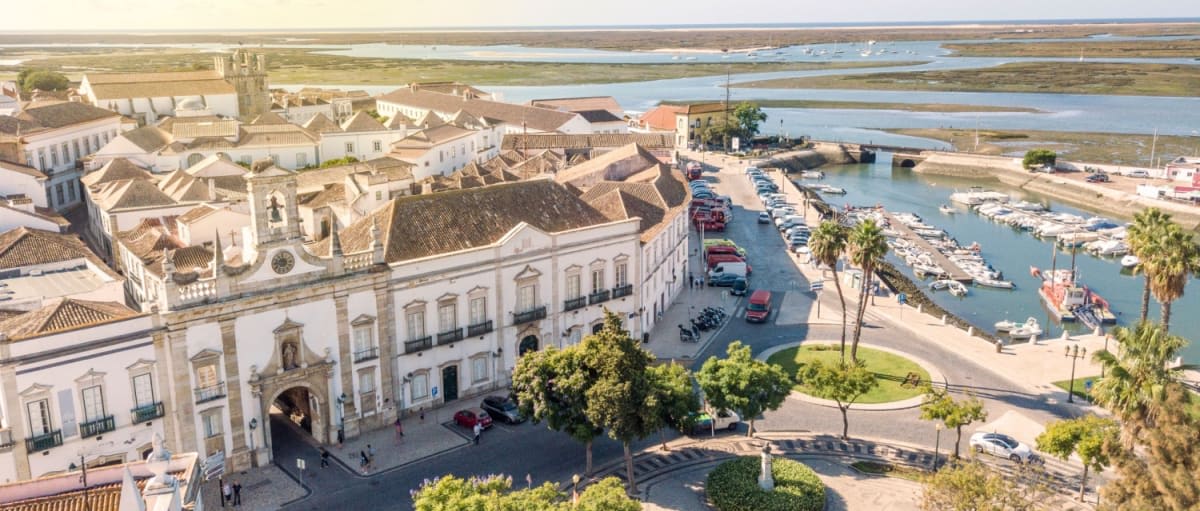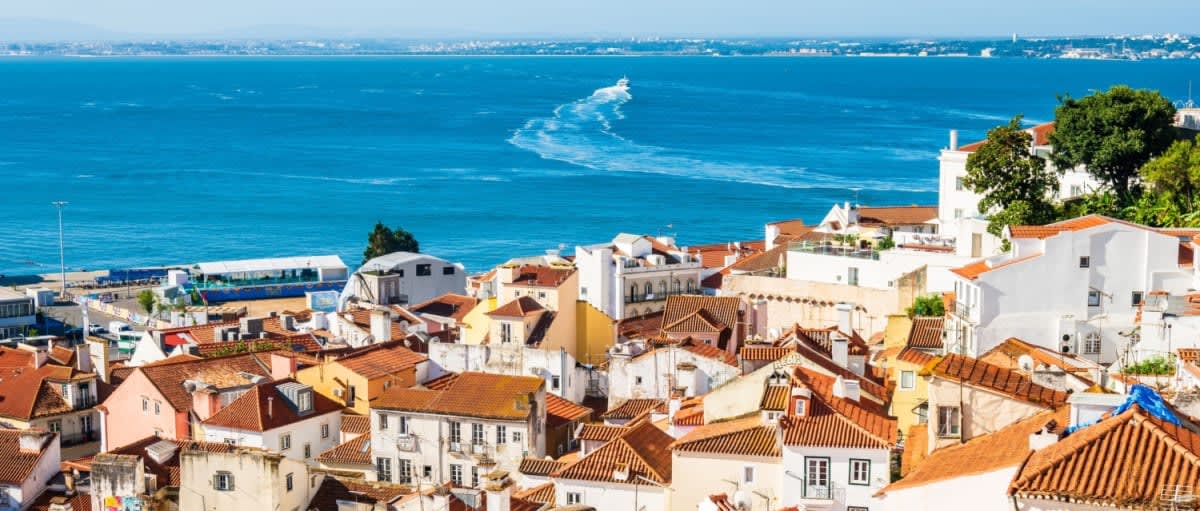Portugal remains one of Europe’s most attractive destinations for property investors. Buoyed by demand from local buyers, international interest and strong tourism figures, investors in 2025 are finding fresh opportunities in both rental income and long-term capital growth. Investing in Portuguese property can make for a steady return to rely on.
Government programmes such as residency visas for professionals and retirees, fast urban development in Lisbon and Porto and the affordability of inland areas all support continued foreign investment. However, a complex legal landscape, tighter licensing rules and evolving tax regulations mean it’s crucial for non-resident buyers to have the right guidance from the outset.
Below, we’ll explore the current state of the Portuguese property market, identify profitable investment areas, and look at how you can manage your property efficiently from overseas.
Contents

The property market in Portugal today
In 2025, Portugal continues to offer good potential to those seeking overseas property investment. After a brief slowdown in 2023–2024 due to increased borrowing costs, the market is returning to stable growth. Urban regeneration in Lisbon and Porto is leading the way, with new developments, office spaces and transport links drawing both domestic and international demand.
Lisbon and Porto remain the top cities for capital growth, with small to mid-sized apartments proving the most in-demand asset class. These cities have seen an influx of digital workers and relocating professionals, creating robust demand in both the long-term rental and sales markets.
Outside of the cities, coastal areas like the Algarve continue to command high prices, driven by demand for second homes and holiday rentals. Meanwhile, rural regions such as Alentejo and central Portugal still offer properties below €100,000, many with renovation potential. Though, you should avoid the potential pitfalls of buying a property in Portugal if you plan to renovate.
Both foreign and Portuguese buyers are increasingly focusing on energy performance ratings, with green building certifications becoming more valued each year. However, unlike in some EU counterparts like Germany or France, nationwide enforcement remains inconsistent.
For investors, 2025 offers a mix of high-yielding city lettings and long-term capital growth in emerging areas. Those buying to let should seek legal and financial advice tailored to local regulations, especially concerning short-term rentals.
For more detail and a step-by-step walkthrough of the process of investing in Portugal, claim your free copy of our Portugal buying guide:
Download the Portugal Buying Guide
How to build a profitable property portfolio
A successful property portfolio in Portugal requires a detailed plan. Profitability often depends on location, rental demand and how efficiently you manage expenses such as maintenance, taxation and compliance.
- Know your market: Before you invest, research demand hotspots thoroughly. Look into commuter towns outside Porto and Lisbon, coastal communities with winter-long tourism and regions where student accommodation is undersupplied.
- Understand legal limits: Regulations around short-term letting have become stricter in many cities. Make sure your lawyer checks zoning laws and AL (Alojamento Local) licence requirements in the area you plan to buy.
- Clarify your purpose: Decide whether your primary goal is monthly income or long-term growth. Yield-focused buyers tend to favour small apartments in urban or touristic areas, while those seeking capital gains often opt for renovation projects in up-and-coming regions.
- Account for all costs: Always include purchase taxes, legal fees, agency commissions, ongoing insurance, community fees and tax declarations in your forecasts. Unexpected expenses can erase profits quickly.
- Diversify your holdings: Portfolio diversification helps limit your exposure to negative market shifts in one region or property type. You might invest in both city flats and coastal villas or mix short-term lets with long-term tenancies.
- Review regularly: Property is not a ‘set and forget’ investment. Rents can fall or rise. Local laws can change. Reassess your holdings annually with guidance from your financial or tax adviser to ensure they align with your overall investment goals.
With a clear strategy and independent legal support, property investment in Portugal can be a profitable addition to any international portfolio – particularly for those who embrace technology, research and professional advice.
Rental yields: what to expect in 2025
Average gross rental yields in Portugal remain attractive in 2025, especially for city apartments and well-located coastal homes. According to figures from Best Yield Finder, national gross rental yields remain steady at around 5.2% annually.
By type and location, rental returns can vary significantly. Based on updated 2025 data, you can expect:
- Sétubal: 4.7% (high tourist activity and growing industry)
- Porto: 5.1% (student and digital nomad population)
- Aveiro: 4.4% (coastal location with year-round demand)
- Faro: 4.6% (airport connectivity and tourism)
- Braga: 4.9% (tech cluster and family rental market)
- Lisbon: 4.6% (high prices and strong long-term let demand)
Short-term holiday lets can deliver daily rates well above long-term income, but they come with higher turnover costs and tighter regulation. Cities like Lisbon, Porto and Albufeira now limit the number of licences issued for short-term rentals in specific neighbourhoods.
You should also note that rental income is subject to progressive tax rates if you’re not resident in Portugal. Speak to a tax adviser to understand how registering your income and claiming expenses may affect your returns.
Buyers aiming for reliable income should weigh local demand, seasonal variation and running costs before committing. With the right support, there is still strong potential for healthy rental profits.
Rental rules and legal advice for non-residents
Letting property in Portugal involves specific legal steps, and licensing requirements differ between short-term and long-term lets. Non-resident owners must follow Portugal’s tax and zoning laws strictly to avoid fines or suspension of rental activity.
For short-term holiday lets, you’ll need an Alojamento Local (AL) licence. Portugal introduced new rules in 2024 limiting the number of AL properties in urban centres. Some Lisbon and Porto neighbourhoods now have strict caps or bans on new licences. Make sure your lawyer checks the local municipal plan before you buy.
Key legal requirements for rental properties include:
- Registration with the Registo Predial (Land Registry)
- AL licence application from the local council (Câmara Municipal)
- Annual renewal of licence and internal inspections
- Tax registration with the Portuguese Tax Authority (Finanças)
AL income must be declared in Portugal, even if your property is managed through a company or agent. Rental profits are taxed at a flat rate of 28% for non-resident individuals. Portuguese residents may be able to opt for progressive income tax rates.
For long-term lets, tenancy laws strongly favour tenants. Evicting a defaulting tenant can take up to one year. Always use a written rental agreement and carry out full background checks before signing any long-term lease.
Legal advice is essential for ownership structuring too. Some investors choose to buy through a Portuguese company such as an Sociedade por Quotas or Sociedade Civil for tax and inheritance planning. Your ownership structure can affect your tax obligations and transfer costs later on.
Working with a property management company
Unless you live full-time in Portugal, hiring a property manager is often the best way to protect your investment. Their services typically include tenant support, maintenance coordination, cleaning and local troubleshooting.
For short-term rentals, management services are essential. Lettings require weekly changeovers, emergency assistance and inventory reporting. A professional manager will also handle bookings, collect deposits, meet legal safety standards and deal with guest feedback – all crucial to maintaining strong annual returns.
Expect management fees to range from 15% to 25% of rental income depending on location and service level. That can feel high, but when facing urgent damages or peak-season turnovers, in-person support adds value well beyond the cost.
Long-term lets may require less direct involvement but still benefit from outsourcing. For example, a local team can collect rent, manage repairs and solve disputes with tenants – providing peace of mind for non-resident landlords.
If you’d prefer a low-cost approach, some owners assign responsibilities to friends or neighbours. However, this can introduce personal strain if problems arise. Always formalise these arrangements in writing, and consider backup options.
A good property manager keeps your real estate running smoothly and protects your reputation with tenants or guests. Take the time to meet providers before choosing, and ask for references from other absentee landlords.
Paying costs and receiving income in euros
If you live outside the eurozone and own property in Portugal, fluctuating exchange rates can have a big impact on your income and expenses. From paying management fees and insurance to transferring rental income into your local currency, even small rate changes can have a large effect over a year.
One way to manage this risk is to open a dedicated euro account in Portugal. This helps centralise your income from lettings and simplifies payments to local contractors. Portugal’s main banks offer online access and English-speaking support, particularly in areas popular with international buyers.
Transfers from your home currency can be made more effective with the help of a currency exchange specialist. Instead of relying on high-street banks, specialist providers give better rates, faster transfers and added flexibility. Their services include:
- Forward contracts: Fix the exchange rate months ahead to protect against market swings
- Regular payment plans: Automate monthly transfers to cover ongoing costs
- Market alerts: Stay updated on favourable rates
For example, locking in a favourable exchange rate ahead of a major repair bill, or setting regular monthly payments in euros, avoids surprises and keeps your budget predictable. These tools are especially useful between signing and completion when large transfers are due.
We partner with Smart Currency Exchange, who have provided decades of service to overseas buyers. Book a call today to find out how they can help you.
Currency services are a vital part of planning property investment abroad. Smart use of these platforms will prevent shortfalls and help you move money without stress or delay.
Start your investment journey in Portugal
As one of Europe’s most open property markets, Portugal remains highly accessible to international buyers. Its deep legal protections, rental demand and lifestyle benefits continue to attract both first-time buyers and experienced investors.
But success in this market comes from preparation – not luck. With the right legal structure, smart use of currency tools and local property professionals on your team, you’ll be well-placed to secure long-term returns.
To start your journey, speak to one of our expert consultants today.
Portugal continues to offer a wealth of opportunities for property investors, but success starts with the right research and expert support. To make smarter decisions, be sure to explore our full breakdown of where to buy property in Portugal and follow our essential guide on how to buy property in Portugal. These resources will help you understand your options, avoid costly pitfalls and maximise returns.
Frequently asked questions about investing in property in Portugal
Yes. With strong demand in Lisbon, Porto and coastal regions, plus favourable legal protections for international buyers, Portugal remains a top destination for property investment in 2025.
Gross rental yields average around 5.2% nationally. Urban areas like Porto and Lisbon typically offer yields between 4.5% and 5.1%, while some regions with student or tourist demand may achieve more.
Yes. Many areas now limit the number of Alojamento Local (AL) licences, especially in Lisbon and Porto. Always check with your lawyer whether new licences can be issued in your chosen area.
Yes, non-residents can buy and legally rent out property in Portugal, though you must comply with tax and licensing requirements. Income from rentals must be declared and is taxed at 28% for non-residents.
Using a currency specialist such as Smart Currency Exchange allows you to lock in rates, schedule payments, and protect against market volatility during the buying process and beyond.









